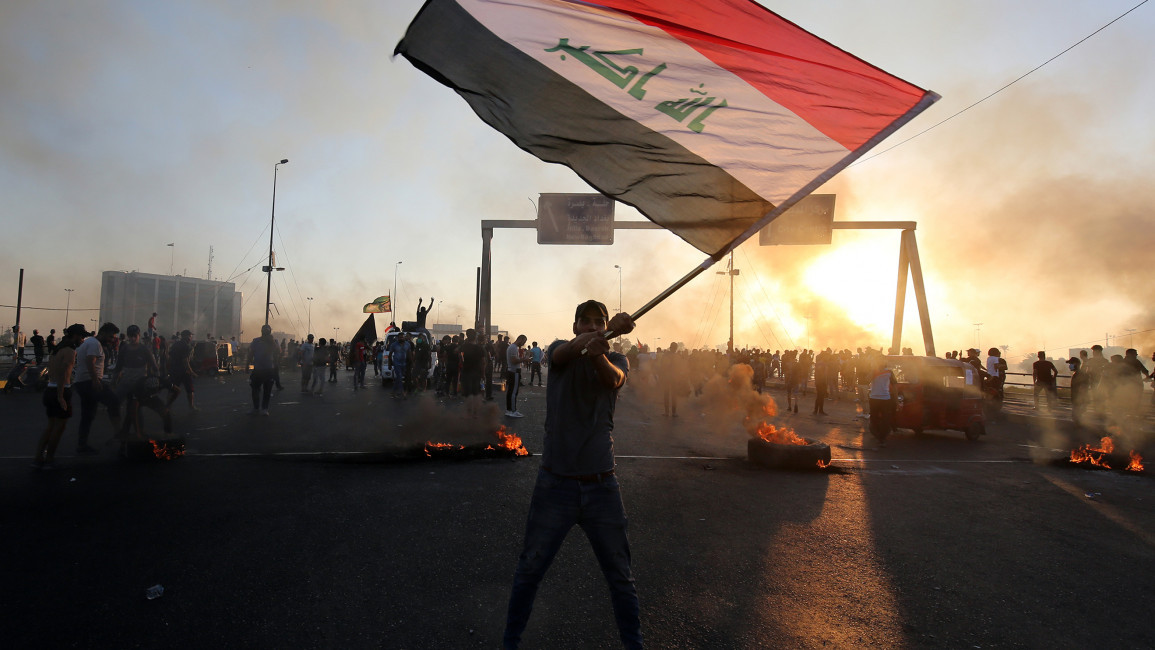Strong criticism follows appointment of Iraqi minister of justice to oversee human rights commission
Iraqi activists and civil society organisations heavily criticised the Iraqi government's decision to appoint its minister of justice to run the administrational and financial affairs of Iraq's High Commission of Human Rights (IHCHR) as censoring and paralysing the commission in the country where abuses of human rights are increasing.
The Iraqi Council of Ministers on 12 September decided that Khalid Shwani, the minister of justice, will oversee the administration and financial affairs of Iraq's human rights commission, the cabinet has announced.
In response, Iraqi activists and civil society organisations argued the decision as a step towards further paralysing and marginalising the IHCHR, a national commission established as per code 53 of 2008 and tasked with monitoring and reinforcing human rights nationwide.
ليس صدفة، بل هو مخطط واضح و مدروس وممنهج، والهدف هو إنهاء جوهر النظام الديمقراطي في العراق من خلال شل عمل أي مؤسسة لها علاقة بالديمقراطية وحقوق الإنسان، منذ انطلاق تظاهرات تشرين في ٢٠١٩ هنالك صراع خفي بين الحكومة و مفوضية حقوق الانسان ( بدأ بَمحاولة ضمها لمجلس الوزراء من خلال… pic.twitter.com/fefNR0L5ji
— Dr. Ali Al Bayati | د. علي البياتي (@aliakramalbayat) September 20, 2023
"It's not a coincidence, but rather a clear, calculated, and systematic plan. The goal is to undermine the essence of the democratic system in Iraq by disabling the work of any institution related to democracy and human rights," Ali al-Bayati, IHCHR's ex-spokesperson, wrote on X, the social media platform previously known as Twitter.
"Since the start of the October 2019 protests, there has been a hidden conflict between the government and the IHCHR. It began with an attempt to incorporate the commission into the cabinet through the Federal Court, which failed," Bayati added.
He also wrote, "Then, there were efforts to harass and threaten its staff, delay the formation of the Commissioners Council, and today, it culminated in transferring the management of this institution to a ministry that is supposed to monitor its work, performance, and commitment to human rights."
Although the previous Iraqi cabinet of Mustafa al-Kadhimi had frozen the IHCHR's work in July 2021 due to political disagreements between parliamentary blocs and factions over their failure to agree on the appointment of a new board of trustees for the commission (which is composed of 11 members and a chairman); most of its members are still engaged in civil society activities and monitoring social and human rights issues.
Khalid is from the Patriotic Union of Kurdistan (PUK), a partner in the Iraqi cabinet headed by Prime Minister Mohammed Shia al-Sudani. PUK, which is also a ruling party in the Kurdistan Regional Government (KRG), has good relations with Iran.
On her part, Iraqi activist Azra Hamid told The New Arab's Arabic sister language website, Al-Araby Al-Jadeed, that "The disputes and harassment faced by IHCHR, culminating in the freezing of its work in 2021, were largely due to the stances by the IHCHR's council of commissioners in supporting the popular protests that erupted in October 2019. This led most of the Iraqi religious as well as political forces and armed factions to consider it as unnecessary."
Hamid added, "The Iraqi government is tightening its grip on civil institutions and organisations, in addition to intimidating activists, trying to insinuate that the human rights issue is externally supported."
She also observed, "The IHCHR is currently under clear government control, despite being an independent body that should operate freely."
IHCHR, established in 2008, is considered one of the independent bodies in the country, and it is practically linked to the parliament, similar to other independent bodies, including the Media and Communications Authority, the Independent High Electoral Commission of Iraq (IHEC), and the Integrity Commission.
IHCHR's mission includes monitoring human rights violations in the country, receiving and investigating complaints, filing lawsuits against those involved in various acts of violence, monitoring prisons and reform centres, and assessing the work of security and military institutions and their complying with the human rights principles.
However, the commission has faced numerous allegations over its failings in monitoring violations in the past few years, especially following Iraq's 2019 popular protests.
Demonstrators, mainly younger generations, had camped out in the capital's Tahrir Square and many other provinces from October 2019 until early 2020, decrying endemic corruption, poor services and unemployment by the former Iraqi government led by Adil Abdul-Mahdi.
The Iraqi security forces harshly cracked down on the protests and Iran-backed Shia militias. Consequently, more than 800 protestors were killed and thousands wounded.
Ultimately, Abdul-Mahdi was forced to resign and was replaced by Mustafa al-Kadhimi.
Human Rights Watch (HRW), in its 2022 annual report published early this year, blastIraq'sq's central government and autonomous Kurdish authorities for failing to provide fundamental human rights, targeting civil society actors and failing to prosecute abusers of human rights in recent years.



